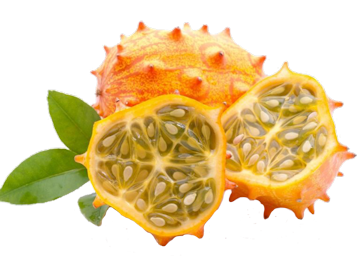|
Provides Several Potent Antioxidants
Kiwano melon is not only nutritious but also offers several potent antioxidants — many of which are nutrients themselves.
Antioxidants are compounds found in certain foods that can protect against cellular damage caused by oxidative stress in your body. Though oxidative reactions are a normal part of human metabolism, too much oxidative strain can result in inflammation and impaired cellular function over time. You can minimize this potential damage by providing your body with an adequate supply of antioxidant-rich foods like kiwano melon.
The main antioxidants in kiwano melon are vitamin C, vitamin A, zinc, and lutein. Together, these nutrients play a role in reducing inflammation and preventing chronic diseases, such as diabetes, heart disease, and certain types of cancer .
Moreover, the edible seeds found within the fruit’s pulp provide vitamin E — another nutrient with antioxidant properties
Promotes Healthy Red Blood Cell Production : Kiwano melon is a good source of iron and provides about 13% of your daily needs . Red blood cells store an iron-containing substance called hemoglobin, which is used to transport oxygen through your body. Thus, an adequate supply of dietary iron is necessary for your body to produce enough healthy red blood cells for proper oxygenation .
Plant sources of iron — such as kiwano melon — contain a form of the mineral known as non-heme iron. This form isn’t absorbed as efficiently as iron from animal sources. However, pairing non-heme iron with vitamin C enhances its absorption rate
Coincidentally, kiwano melon supplies a significant amount of vitamin C as well. This can improve the absorption of the iron present within the fruit, making it more effective for supporting red blood cell production and oxygen transport .
Promotes Blood Sugar Control : Kiwano melon has a low glycemic index, meaning it doesn’t cause a significant spike in blood sugar after you eat it. Additionally, it’s a rich source of magnesium — a mineral that’s directly involved in the metabolism of glucose (sugar) and insulin
A small study found that kiwano melon extract significantly reduced blood sugar in diabetic rats but not in animals with normal blood sugar levels.
Ultimately, more research is needed to determine whether kiwano melon affects blood sugar in humans.
Supports Proper Hydration : Water alone is often thought to be synonymous with hydration. However, electrolytes — such as potassium, magnesium, and sodium — are also necessary for maintaining healthy fluid status Kiwano melon is made up of about 88% water and contains carbs and electrolytes — making it useful for increasing hydration
Snacking on a fruit like kiwano melon on a hot summer day or after vigorous exercise can help keep you fueled and well-hydrated throughout the day.
May Improve Mood : Kiwano melon contains magnesium and zinc — two minerals that are closely related to mental health and healthy brain function maintenance. Both magnesium and zinc are involved in producing neurotransmitters that impact mood and are linked to some mood-related disorders, such as depression and anxiety .
One study evaluated the use of magnesium for treating mild depression and anxiety disorders in 126 people. Those who received magnesium reported significant improvements in their symptoms .
Overall, more research is needed to better understand the role of magnesium and zinc in improving mood or preventing and treating depression, but eating plenty of mineral-rich foods like kiwano melon certainly can’t hurt.
Other Potential Benefits
Research that focuses specifically on kiwano melon’s effect on health is minimal. However, many of the nutrients it contains are well-known for supporting your body’s systems in other ways: Supports bone health: Kiwano melon provides nutrients that support bone remodeling and maintenance of bone strength, including magnesium, vitamin C, and zinc.
Encourages healthy skin: The vitamin C and water in kiwano melon may support collagen production, wound healing, and protection from sun damage .Promotes heart health: Kiwano melon is a rich source of magnesium and potassium. These minerals can reduce inflammation, prevent the accumulation of arterial plaque, and help regulate blood pressure .
Strengthens immunity: Kiwano melon also offers multiple nutrients that are vital for a healthy immune system, including vitamin C, zinc, iron, and magnesium
While kiwano melon contains many important nutrients, no single food holds the key to optimal health.
Consider including kiwano melon alongside other nutrient-dense foods to get the most benefit from your diet.
|

